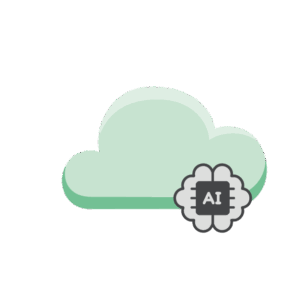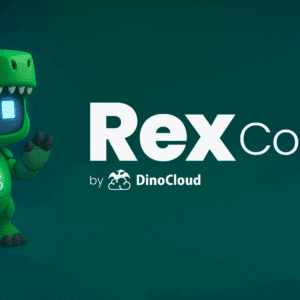
“Cloud computing is not only the future of computing, but the present and the entire past of computing.” – Marc Benioff
In this article, we will delve into the world of cloud computing services and explore how they can benefit businesses. At DinoCloud, we are a leading cloud services provider with extensive experience backed by AWS. As a premier tier partner, we offer innovative and customized solutions that optimize operational efficiency and data security for our clients. Join us as we explore the evolution and impact of cloud computing services, different cloud service models, the AWS cloud, cloud computing benefits, custom cloud solutions, key considerations for cloud deployment, and conclude with a summary of the key takeaways.
Key Takeaways
- Cloud computing services offer businesses a shared pool of resources over the internet.
- There are three main cloud service models: IaaS, PaaS, and SaaS.
- AWS is a leading cloud computing platform that provides a wide range of services.
- Cloud computing offers benefits such as scalability, flexibility, cost savings, and operational efficiency.
- DinoCloud specializes in providing custom cloud solutions tailored to businesses’ needs.
The Evolution and Impact of Cloud Computing Services
In today’s rapidly evolving technological landscape, cloud computing services have emerged as a game-changer for businesses across industries. The evolution of cloud computing services has revolutionized the way organizations operate, enabling on-demand access to a shared pool of resources over the internet. This section delves into what cloud computing services are, their definition, and the technology behind them, while highlighting their significant impact on businesses. Let’s explore the evolution and transformative power of cloud computing services.
What is Cloud Computing Services?
Cloud computing services involve the delivery of computing resources, including servers, storage, databases, networking, software, and analytics, over the internet. Instead of managing and maintaining physical infrastructure and resources on-premises, businesses can leverage these services to access virtualized resources hosted by cloud service providers.
With cloud computing services, businesses can scale their operations efficiently, reduce costs, and leverage advanced technologies without the need for substantial upfront investments. The cloud computing model offers flexibility, allowing organizations to adopt and utilize the resources they need, when they need them, across various service models and deployment options.
The impact of cloud computing has been profound, driving innovation, agility, and competitiveness in the business landscape. By harnessing the power of the cloud, organizations can focus on their core competencies while leveraging robust and secure cloud infrastructure and services to meet their IT requirements.
Now that we understand the definition of cloud computing services, let’s delve deeper into the technology that underpins this revolutionary paradigm.
Cloud Computing Technology
Cloud computing technology encompasses a range of components and architectures that enable the delivery of cloud services. Key technologies include virtualization, distributed computing, and efficient resource allocation.
Virtualization is a foundational technology that allows the creation of virtual instances of physical resources, such as servers, storage, and networks. This virtualization layer enables the pooling of resources, ensuring optimal utilization and flexibility in allocation.
Distributed computing enables cloud computing services to be accessed over the internet from multiple locations simultaneously. By distributing computational tasks across different servers and data centers, organizations can achieve scalability, fault tolerance, and high performance.
Efficient resource allocation is a crucial aspect of cloud computing technology. Cloud service providers ensure that resources are allocated dynamically based on demand, enabling businesses to scale up or down as needed. This ensures optimal resource utilization and cost efficiency for organizations.
Together, these technologies form the foundation of cloud computing services, enabling businesses to access a shared pool of resources securely and efficiently. The impact of cloud computing services on businesses has been profound, transforming the way organizations operate, collaborate, and innovate.
Summary
Cloud computing services have evolved to become an integral part of the business landscape, offering on-demand access to a shared pool of resources over the internet. In this section, we explored the definition of cloud computing services and the technology behind them, highlighting their significant impact on businesses. Now that we have a solid understanding of cloud computing services, we can dive deeper into the different cloud service models in the next section.
An Overview of Cloud Service Models
Cloud service models offer businesses different levels of control and flexibility in utilizing cloud computing services. In this section, we will provide an overview of three main cloud service models: Infrastructure as a Service (IaaS), Platform as a Service (PaaS), and Software as a Service (SaaS). Let’s explore the characteristics, use cases, and benefits of each model:
1. Infrastructure as a Service (IaaS)
In the Infrastructure as a Service (IaaS) model, businesses have access to virtualized computing resources, including virtual machines, storage, and networking infrastructure, over the internet. With IaaS, organizations can build, manage, and scale their own virtualized infrastructure as needed. This flexibility allows businesses to focus on their core competencies while reducing the cost and complexity associated with managing physical infrastructure. Examples of IaaS providers include Amazon Web Services (AWS).
2. Platform as a Service (PaaS)
Platform as a Service (PaaS) provides businesses with a complete development and deployment environment in the cloud, allowing them to build, test, and deploy applications without the need to manage the underlying infrastructure. PaaS offers a range of services, including development frameworks, databases, and middleware, enabling developers to focus on coding and accelerating application development.
3. Software as a Service (SaaS)
Software as a Service (SaaS) delivers software applications over the internet, eliminating the need for businesses to install and maintain software on their own servers. With SaaS, organizations can access applications directly through a web browser, enabling easy collaboration and reducing the strain on internal IT resources. SaaS providers handle the maintenance, security, and updates, allowing businesses to focus on using the software to streamline their operations.
| Cloud Service Model | Characteristics | Use Cases | Benefits |
|---|---|---|---|
| Infrastructure as a Service (IaaS) | Virtualized computing resources, scalability, and control | Building and managing scalable web applications, disaster recovery, and test and development environments | Flexibility, cost savings, reduced operational complexity |
| Platform as a Service (PaaS) | Complete development and deployment environment, rapid application development | Web and mobile application development, microservices architecture, and continuous integration and deployment | Accelerated development cycles, reduced infrastructure management, improved collaboration |
| Software as a Service (SaaS) | Web-based software applications, automatic updates and maintenance | CRM systems, collaboration tools, project management platforms, and email and communication services | Easy access, reduced IT overhead, scalability |
AWS Cloud
The AWS Cloud, provided by Amazon Web Services, is a leading cloud computing platform that offers businesses a wide range of services to harness the power of the cloud. With AWS cloud, businesses can leverage a robust and secure cloud infrastructure to meet their diverse needs.
At AWS, we understand the importance of scalability and reliability for businesses operating in the digital age. Our cloud computing platform provides flexible and scalable solutions that enable businesses to rapidly expand their operations and meet customer demands. With a vast range of services, businesses can easily deploy applications, store and analyze data, and optimize their workflows.
One of the key benefits of the AWS cloud is its extensive catalog of services, which caters to various business requirements. For example, AWS provides compute services such as Amazon Elastic Compute Cloud (EC2), which offers secure, resizable compute capacity in the cloud. Organizations can also leverage Amazon Simple Storage Service (S3) to store and retrieve vast amounts of data in a highly scalable manner.
In addition to its comprehensive service offerings, the AWS cloud provides businesses with a secure and reliable infrastructure. AWS incorporates industry-leading security practices, ensuring that data and applications are protected from threats. With AWS, businesses can benefit from advanced infrastructure safeguards, data encryption, and network security features.
The AWS cloud is an ideal cloud computing platform for businesses of all sizes, from startups to enterprise-level organizations. Its flexibility, scalability, and reliability make it a top choice for businesses looking to optimize their operations and leverage the benefits of cloud computing. Whether businesses need to deploy new applications, scale their infrastructure, or analyze large datasets, the AWS cloud provides the necessary tools and resources.
By utilizing the AWS cloud, businesses can focus on innovation and growth, leaving the management and maintenance of the underlying infrastructure to the experts. With our cloud computing platform, businesses can streamline their operations, reduce costs, and enhance their ability to deliver value to customers.
Cloud Computing Benefits in the Business Landscape
Cloud computing offers numerous benefits to businesses of all sizes. In this section, we will explore the advantages of cloud computing in the business landscape. We will discuss the scalability and flexibility benefits that allow businesses to easily scale their resources up or down as needed. Additionally, we will highlight the cost savings and operational efficiency advantages that can be achieved through cloud computing.
Custom Cloud Solutions by DinoCloud
At DinoCloud, we specialize in providing custom cloud solutions tailored to the unique needs of businesses. Our team of experts has extensive experience in the cloud computing industry, allowing us to deliver innovative and effective solutions that optimize operational efficiency and data security.
One of our key offerings is managed cloud services. We understand that managing and maintaining a cloud infrastructure can be complex and time-consuming for businesses. That’s why we offer comprehensive managed cloud services, taking care of all aspects of your cloud environment, from monitoring and maintenance to security and support. With our managed cloud services, you can focus on your core business activities, while we handle the technical aspects of your cloud infrastructure.
Another area where we excel is cloud migration services. We understand that migrating to the cloud can be a daunting task, but with our expertise and experience, we can seamlessly transition your business to the cloud. Our cloud migration services include assessment, planning, implementation, and post-migration support, ensuring a smooth and successful migration process. We leverage industry best practices and proven methodologies to minimize downtime and maximize the benefits of cloud computing for your business.
In addition to custom solutions and migration services, we also offer cloud consulting to help businesses make informed decisions about their cloud strategies. Our team of cloud experts will work closely with you to understand your business goals and challenges, and provide strategic guidance on how to leverage the cloud for maximum benefit. Whether you’re looking to optimize your existing cloud environment, plan a cloud migration, or explore new cloud technologies, our cloud consulting services can provide the expertise and insights you need.
| Service | Description |
|---|---|
| Managed Cloud Services | Comprehensive management and support for your cloud infrastructure, ensuring optimal performance and security. |
| Cloud Migration Services | Seamless transition of your business to the cloud, minimizing downtime and maximizing the benefits of cloud computing. |
| Cloud Consulting | Expert guidance and strategic insights to help businesses make informed decisions about their cloud strategies. |
When it comes to custom cloud solutions, managed cloud services, cloud migration services, and cloud consulting, DinoCloud is a trusted partner for businesses of all sizes. With our expertise, experience, and commitment to customer satisfaction, we can help you successfully navigate the cloud and optimize your operations. Contact us today to learn more about how we can tailor our cloud services to meet your unique business needs.
Key Considerations for Cloud Deployment
Choosing the Right Cloud Deployment Model
When considering cloud deployment, businesses need to carefully evaluate their requirements and objectives to choose the most suitable cloud deployment model. There are three primary cloud deployment models: public cloud, private cloud, and hybrid cloud.
Public Cloud: Public cloud deployment involves hosting applications and data on the infrastructure provided by a third-party cloud service provider. This model offers scalability, flexibility, and cost-effectiveness, making it ideal for businesses with dynamic workloads and limited IT resources.
Private Cloud: Private cloud deployment involves hosting applications and data on dedicated infrastructure that is operated exclusively for a single organization. This model offers enhanced control, security, and compliance, making it suitable for businesses with sensitive data or regulatory requirements.
Hybrid Cloud: Hybrid cloud deployment combines the use of both public and private cloud environments, allowing businesses to leverage the benefits of both models. This model offers greater flexibility, scalability, and data control, making it suitable for businesses with diverse workloads and varying data requirements.
Choosing the right cloud deployment model depends on a variety of factors, including the nature of the business, data sensitivity, regulatory compliance requirements, and scalability needs. It is important for businesses to evaluate their specific needs and consult with cloud experts to make an informed decision.
Ensuring Data Security and Compliance
Data security and compliance are paramount considerations for businesses deploying cloud solutions. When entrusting sensitive data to the cloud, it is crucial to implement robust security measures to protect against unauthorized access, data breaches, and other security threats.
Businesses should choose cloud service providers that prioritize data security and compliance. Look for providers that offer strong encryption, multi-factor authentication, and regular security audits. Additionally, ensure that the provider adheres to industry-standard security certifications such as ISO 27001 and SOC 2.
Compliance with industry regulations and legal requirements is equally important. Businesses must ensure that their chosen cloud deployment model aligns with applicable regulations, such as GDPR, HIPAA, or PCI DSS. It is advisable to consult with legal experts to understand the compliance obligations and ensure that the cloud service provider can meet those requirements.
In conclusion, choosing the right cloud deployment model and ensuring data security and compliance are critical considerations for businesses embarking on a cloud journey. By carefully evaluating their needs, consulting with experts, and partnering with reputable cloud service providers, businesses can unlock the full potential of cloud computing while safeguarding their data and ensuring regulatory compliance.
Conclusion
Throughout this article, we have explored the world of cloud computing services and the numerous benefits they offer to businesses. Cloud computing has revolutionized the way organizations operate, providing on-demand access to a shared pool of resources over the internet. As we have seen, cloud computing allows for scalability and flexibility, allowing businesses to easily adjust their resources to meet changing needs. This, in turn, leads to significant cost savings and improved operational efficiency.
When considering cloud computing, it is crucial to choose the right cloud service model and deployment strategy. The three main cloud service models—Infrastructure as a Service (IaaS), Platform as a Service (PaaS), and Software as a Service (SaaS)—each offer different levels of control and flexibility. By understanding these models and their use cases, businesses can make informed decisions that align with their specific requirements.
Partnering with a trusted cloud services provider, such as DinoCloud, is essential for a successful cloud journey. DinoCloud, backed by Amazon Web Services (AWS), offers innovative and customized cloud solutions tailored to the unique needs of businesses. With our expertise in managed cloud services, cloud migration, and cloud consulting, we can help organizations navigate the complexities of the cloud and optimize their operations for long-term success.
In conclusion, cloud computing services have the power to transform businesses by providing scalable, flexible, and cost-effective solutions. By embracing the cloud and making informed choices, organizations can unlock the full potential of cloud computing and gain a competitive edge in today’s digital landscape.
FAQ
What are cloud computing services?
Cloud computing services refer to the on-demand access and provisioning of computing resources, such as storage, servers, databases, software applications, and networking, over the internet. These services allow businesses to utilize scalable and flexible infrastructure without the need for on-premises hardware or maintenance.
How have cloud computing services evolved and impacted businesses?
Cloud computing services have evolved from basic infrastructure provisioning to a comprehensive suite of solutions that enhance business agility, scalability, and operational efficiency. The impact of cloud computing services on businesses ranges from cost savings and improved collaboration to enabling innovation and facilitating remote work environments.
What are the different cloud service models?
The three main cloud service models are Infrastructure as a Service (IaaS), Platform as a Service (PaaS), and Software as a Service (SaaS). IaaS provides virtualized computing resources, PaaS offers a platform for developing and deploying applications, and SaaS delivers software applications over the internet.
What is AWS cloud?
AWS cloud refers to the cloud infrastructure and services provided by Amazon Web Services (AWS), a leading cloud computing platform. AWS offers a vast range of services, including compute power, storage, databases, artificial intelligence, and analytics, to help businesses build and run applications on a scalable and secure cloud platform.
What are the benefits of cloud computing in the business landscape?
Cloud computing brings numerous advantages to businesses. It offers scalability and flexibility, allowing businesses to easily adjust their resources based on demand. Cloud computing also provides cost savings by reducing the need for upfront investments in hardware and maintenance. Additionally, it improves operational efficiency by automating processes and enabling remote collaboration.
What custom cloud solutions does DinoCloud offer?
At DinoCloud, we provide a range of custom cloud solutions, including managed cloud services, cloud migration services, and cloud consulting. Our expert team helps businesses optimize their cloud deployments, migrate their infrastructure and applications to the cloud, and provides tailored consulting to leverage the full potential of cloud computing.



